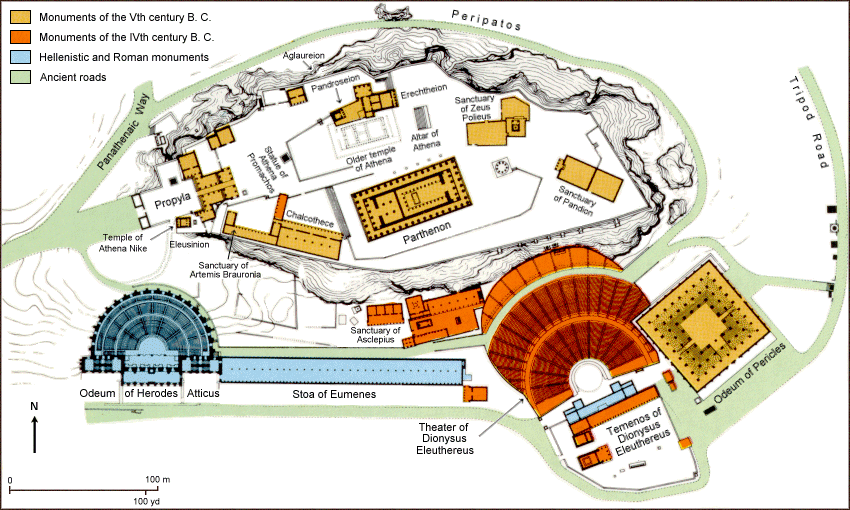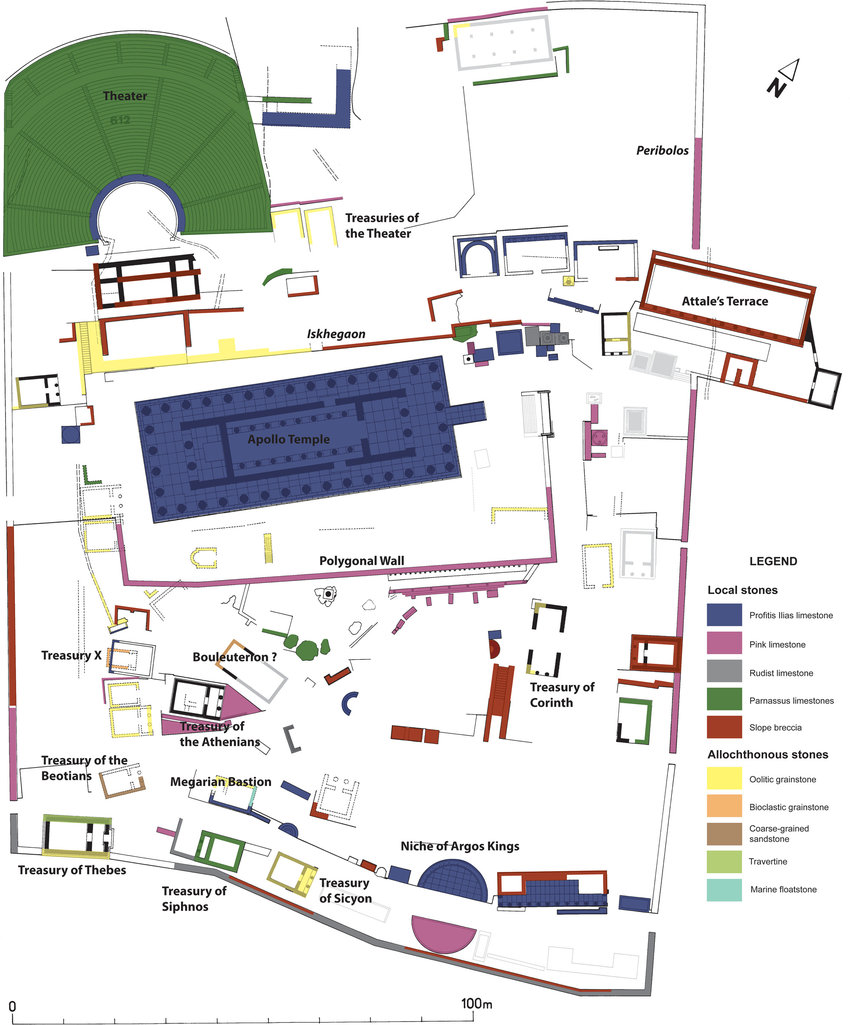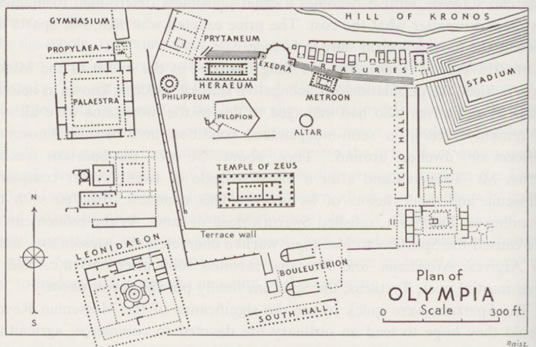Greek Religion
1/101
Earn XP
Name | Mastery | Learn | Test | Matching | Spaced | Call with Kai |
|---|
No analytics yet
Send a link to your students to track their progress
102 Terms
Panathenaic Amphora
333-332BCE
Athens
Produced for every Greater Panathenaia
Given as prizes to the winners
Many given- event specific
Inscription by columns names the Archon
Black Figure Panathenaic Amphora (Men)
Running race, generic looking, nude, stylised musculature, not white skin
Black Figure Panathenaic Amphora (Athena)
White skin (mirrors Cryselephantine Statue + done for women), so tall, two columns with small Athenas- Athena Nike?, pose of Athena Promachos, Athena in a Kyton, Helmet with a high crest, spear raised to strike, hoplon shield, Himaition sleeves
Ninnion Tablet
Ninnion = woman’s name
Demeter and Persephone seated
Iacchus with 2 torches, leading the Mystae
Mystae are carrying wheat and dancing
Shaped like a temple with a pediment on top and a pillar in the top left
Nausicaa Painter Red-Figure Amphora (Side A)
2 young oxen with large tripods behind them (gifts?)
2 Priestesses, young women with bare arms and youthful hair
Priestesses laid garlands on the oxen (fillets), prepped for sacrifice
Could represent wingless Athena Nike (like in the Temple to Athena Nike, as the Amphora is from Attica)
Nausicaa Painter Red-Figure Amphora (Side B)
4 individuals, 2 women and 2 men.
A Priest, a woman with a kylix and vessel for libation pouring, a man with a raised hand- purification ritual
Anatomical Votive Offering of a foot (inscription)
“Offered by Tyche in dedication to Asklepios and Hygeia on behalf of his daughter”
Anatomical Votive Offering of a foot (key points)
Marble (spending a lot to thank), Gift (healing worked), Hygeia (infection + Asclepius worked with his daughter), Daughter (healed women), Foot (Asclepius healed legs)
Kodros Painter Kylix depicting Pythia Consultation (Pythia)
Sitting on tripod, Priestess’ hood, same height as King, bowl (libation), laurel leaf (Apollo)
Kodros Painter Kylix depicting Pythia Consultation (King)
Laurel crown (King), standing, asking in person, represents Aegus (Mythical Athenian King), same height as Pythia
Kodros Painter Kylix depicting Pythia Consultation (Rest)
Kylix, so slowly revealed image in centre (the Tondo), Column (inside a temple + could be a barrier between Pythia and King), designed for Etruscans (Northern Italy- could be exaggerated Greek Culture)
Acropolis meaning
Acro = Sky Polis = City (Sky City)
Acropolis buildings
Parthenon, Erechtheion, Propylaia, Sacred Way, Temple of Athena Nike, Altar of Athena Polias, Sanctuary of Zeus Polieus, Eleusinion, Statue of Athena Promachos
(Painted marble) Pericles ordered for the Acropolis (politician)

Parthenon
Metopes: East of Gigantomachy, South of Centauromachy, West of Amazonomachy, North of Trojan Wars.
West Pediment = Athena Versus Poseidon, East Pediment = Ionic Frieze of Athena’s birthday (Panathenaia)
Statue of Athena Parthenos- Phidias’ Cryselephantine Statue
^ Civilisation versus Barbarian
Gabled Roof
Erechtheion
Caryatids (6 women statues as pillars), Asymmetrical, cult statue of Athena Polias (wooden)
Temple of Athena Nike
South Frieze = Greeks versus Persians, Nike wingless so she cannot leave Athens, represents victory against the Persians
Delphi
Temple of Apollo w/ Adyton, Altar of the Chians, Snakelike Sacred Way, Marble Siphnian Treasury, Athenian Treasury, Serpent Column, Stadium (high up), Navel of the Earth, side of a mountain, start below temple

Olympia
Temple of Zeus with Chryselephantine Statue of Zeus by Phidias (41 feet tall), Ash Altar (7m), Treasuries from places not on Greek Mainland, Echo Stoa to separate religion and sport, Stadium + chariot races, Zanes on way to the stadium, places to sleep outside + gymnasium

Kindt on Public v Personal
“Personal religion coexisted with other manifestations of the religious”
Burkert on Public v Personal
“Greek Religion… is public religion”
Detienne and Vernant on Sacrifice
“Sacrifice is fundamentally about killing to eat”
Naiden on Sacrifice
“Sacrificed served to maintain… the relationships between the mortals and gods”
Garland on Atheism
“Atheism was, however, undeniably in the air”
Scott on Atheism
“Atheism was not an option”
Zaidman and Pantel on Cults
“Greek identity could be affirmed through common religious cults”
Sourvinou and Inwood on Cults
“Oikos cults are regulated by the polis”
Aston on Panhellenic
“Panhellenic layer of culture”
Mikalson on Panhellenic
“was a closed community… worship of those deities was a marker of membership”
Herodotus Book 2
“Homer and Hesiod are the poets who composed theogonies and described the gods for the Greeks”
Hesiod’s Gods
Agriculture (Works and Days), Moral life (Theogony), Power (Zeus defeating Titans), aid mortals (Prometheus), Wary of mortals (Pandora’s Box), Complex (Libations won’t work if you don’t wash hands), Capricious, Muses inspired him
Homer’s Gods
Capricious, Favourites, Godly councils, scary (book 12 Odyssey), Immortality, Capricious, Muses inspire Homer
Homeric Hymns
Short poems, myths and prayers. Homeric Hymn to Demeter. Panhellenic. Followered Homeric structures of the Gods
Demeter = Demeter the Black
Arcadia
Reciprocal Relationship
Offerings (mortals) + help/no harm (Gods)
Zeus Naos
Zeus of the Spring, Dodona, God of Prophecy
Poseidon Erechtheus
Athens, Epithet of a Hero, Erechtheon on Acropolis
Panhellenic heroes
Herakles, Pelops, Achilles, Odysseus (Homeric Works), Aeschylus (Sanctuary at Epidaurus)
Pelops
Shrine at Olympia Pindar describes as “drenched in glorious blood offerings”
Kleomedes
Boxer in 71st or 72nd Olympics. Killed 27 children after he was disqualified and disappeared in a temple. Delphi tells the people of Astypalaia to treat him as a hero and offer annual sacrifice
Personal Worship
Can be public, direct connection with the God, a choice!
Private
Within the Household, does not need a direct godly connection
Ekroth on Heroes
“Heroes are also more linked to the cthonian gods than the Olympian.”
Parker on Heroes
““The tendency of the Greeks to appeal to a plurality of gods… appears in this [Hero Cults] area of life more clearly than in any other.”
Fathers in Household Religion
Religious authority, acknowledged the Household Gods daily, tended to the hearth, maintained tombs of ancestors.
Fathers in Polis Religion
Wealthy funded sacrifice, could be priests, attended and could run Deme-Cult, take his family to festivals (Rural Dionysia)
Mothers in Household Religion
Married off with a dowry, worshipped Artemis for future prospects for her child, over 60 year old women aided with funeral rites,
A married woman would turn to Hera Teleia and Aphrodite for her needs as a wife, and, to Artemis, Demeter, and Asclepius for her needs as a woman.
Mothers would offer dedications to Artemis on behalf of their daughters.
Mothers in Polis Religion
Cult Activities for Athena, Artemis and Demeter, Priestesses (especially for Demeter) and also Asclepius
Thesmophoria
Pregnant women would camp out by the sanctuary of Demeter, penis symbols, 3 days (camping, fasting, celebration)
Sons in Household Religion
Athens: Receive his name and be formally introduced into the family at the hearth within ten days of his birth. Joined his father’s Phratry aged 16. Tend his parents and to see to a proper burial for them. Apatouria- a three day festival in early october to Zeus Phratios and Athena Phratrios. Made an offering of hair which for both typically symbolised the transition from childhood to adolescence. Had a long, informal apprenticeship, begun in the ephebeia, in military, political, civic, and religious affair. (Formally registered with state)
Sons in Polis Religion
‘youth’ came to an end only when he reached 30 years of age. Could serve in the athenian boule, the council of 500 representatives from the demes, on the law courts and in administrative positions in the government. Corps of ephebes toured the sanctuaries of Attica, provided escorts for religious processions, participated in games at festivals and themselves made offerings at sanctuaries with strong connections as at the tomb of the heroic dead of the battle of marathon. Could enter the ‘boy’ or ‘beardless’ competitions in the Greater Panathenaia.
Daughters in Household Religion
Married at around the age of 15 and joined the family of her groom through a ritual by the Hearth of her groom’s home, in which she would walk around the fire, showered in dried fruits and nuts. As a baby she was named and formally accepted into the family by a ritual around the family’s hearth (no formal registration into the state)
Daughters in Polis Religion
Aristophanes Lysistrata says how a young girl took part as a:
‘Arrephoros’- a secret ritual performed in May, associated with the temple of Athena Polias. The ‘Arrēphoroi’ were two maidens chosen each year. Carried a basket on their heads from Athena and took it through an underground passage way to the sanctuary of Aphrodite in the Garden, where they left the basket and return with another item. “I was seven years old”
‘Grinder’- Girls would ground the meal for cakes offered to Athena on her altar at various festivals, e.g. Panathenaic Festival
‘Brauronia’- A festival to Artemis Brauronia. Girls would dress as bears at the Sanctuary of Artemis at Brauron, and the festival was required for a girl to marry
‘Basket bearer’- The people who carried the baskets of sacrificial implements at festivals, such as the Panathenaic Procession. Aristophanes’ basket-carriers have necklaces of dried figs, which would be a symbol of fertility
Young girls would make and carry the Peplos for Athena for the Panathenia.
Marriage
Dowry provided along with the Bride (organised between Father and Groom), Before the wedding the bride made an offering, often of childhood toys to Artemis.
Water was fetched in a procession in a special vase, the loutrophoros (bath-water carrier), from a special fountain house
A large, festive banquet
“Unveiling” of the bride to the groom at her father’s home
A torchlit, joyful procession that evening, when the bride, riding on a cart and accompanied by the groom, was delivered by her mother to her mother-in-law in her new home amidst wedding songs with their distinctive refrain:“Hymen oh Hymenaios”; and then more wedding songs outside the new couple’s bridal chamber.
An ancient Greek marriage was not, a union pledged before god.
The bride also placed one drachma in a special collection box for Aphrodite
In the deme Erchia both (Hera Teleia and Zeus Teleios) receive offerings on the same day in Gamelion, the month “of marriages,”- on the day of the festival Theogamia (The Marriage of the Gods). Served by a Priestess
Slaves in Household Religion
Formal hearth acception ritual (like a new bride), tended sacrificial animals and cooked for the feasts, A slave might hold an the altar to Zeus Herkeios if they feared anger from their Master, no deities for slaves
Slaves in Polis Religion
Permitted to enter state sanctuaries to see and make supplications.
Attended certain Sanctuaries, such as Dodona (questions from slaves asking if they should escape), and partaking in the Eleusinian Mysteries
Eleusinian Mysteries
Gather in Athens
Piglet sacrificed and ritual purification
Procession to Eleusis (feat. Sanctuaries to Apollo and Aphrodite, lakes dedicated to Persephone and Demeter)
Telesterion Ceremony- Things Done, Things Seen, Things Said
Revelation
Sharing secret = death in Athens
Kiste (Eleusis)
Sacred Chest
Hierophant (Eleusis)
Chief Priest, from the Eumolpidae family (King Eumolpus’ descendents)
Dadorchus (Eleusis)
Torch Bearer, purple robe, from the Kerykes Family (Keryx’s descendents, first Priest of Demeter at Eleusis)
Kalathus (Eleusis)
Sacred Basket
Kykeon (Eleusis)
Sacred Drink
Asclepius
Son of Apollo. Died and became a Hero. Personal connection to his followers. Daughters who helped him. No malevolence
Epidaurus Sanctuary
Called an Asclepion. Abaton (Supplicants sleep). Temple of Asclepius. Large Altar. Tholos (circle temple with an underground maze). Gym (for recovery). Stadium (Games in Asclepius’ honour). Temple of Artemis (OUTSIDE. For pregnant women). Pregnant and dying not allowed in (blood polluted)
Asclepion Healing
Arrive at Sanctuary
Purification
Pray for help, maybe make a sacrifice
Incubation
Speak to Priests about Incubation or wake up healed
Pay a fee for Asclepius’ help (e.g. Votive Offering of a foot)
Leave healed!
Dodona
High on a Mountain and not next to the Ocean (hard to access).
Iliad Book 16 “dwell the Selli, thine interpreters” (sleep on ground, do not wash their feet)
Odyssey Book 19 “hear the will of Zeus from the high crested Oak”
Herodotus Book 2, says that the Oracle was a dove from Egypt and had a match in Libya. He saw Priestesses at Dodona, and says the ‘dove’ was a foreign woman who merely sounded like a bird.
Slaves asked about escape, wife if she will be a widow, man if his eye is sick from not worshipping Zeus, man asking if he should pay debts.
Zeus Naos (Zeus of the Spring) and Diane (Oracular Titan)
Household Gods
Hestia, Zeus Herkeios, Zeus Ktesios, Apollo Agyeios, Herakles
Hestia
Worshipped in the home, and also a sacred flame in the Agora. Thanked daily for protection. Initiation ceremonies walk around the hearth and have fruits and nuts thrown at them.
Zeus Herkeios
Zeus “of the boundary”. Protected the home and everything within. Small statue in Courtyard. Had a snake to ward off evil. Mentioned in Odyssey Book 22
Zeus Ktesios
Zeus “of Property”. Worshipped as a decorated, 2 handled jar sealed with holy items. Kept in household storeroom and guarded possessions. Those on hard times turned to Zeus Ktesios first.
Apollo Agyeios (sometimes Herakles)
Apollo “of the street”. Protected the entrance way from just inside/outside the front door. Protect from miasma, pollution, evil energies and spirits, Represented by a column or Herm (but not a Hermes Herm, an Apollo/Herakles Herm)
Demes
139 Demes in Athens. Made up the 10 tribes.
Trittys
Collection of Demes
Demarch
Leader of the Deme. Also religious leader for the Deme.
Erchia
43 deities and heroes listed for sacrifices, 41 of which take place in Erchia, 35 cult sites, 6 versions of Apollo (Pythios, Paion), 25 days a year for Erchia worship + 120 Athenian. 59 animals sacrificed, funded by the whole Deme
Hera Telchinia
“A lamb, all black”
Thorgelion
“let the herald… just like the Demarch” (exception)
The heroines
“For the priestess, the skin”
Holocaust
Burning of the animal whole “a ewe-lamb, white, burnt whole, wineless”
Libations
Poured before Symposiums, poured in the Odyssey (book 11). Achilles has a special cup for libations to Zeus (Book 16 Iliad).
Sponde
Libations poured of wine, to ensure protection for a familiar action, such as a symposium
Choe
Offered to Cthonic Deity or the dead. Excluded wine (milk, honey, etc). Aeschylus’ Choephoroi, Elektra pours pure water onto her Father’s tomb.
Votive Offerings
Anatomical Votive Offerings to Asclepius, Miltiades’ helmet dedicated at Olympia, 424 BCE Athens displayed Spartan shields in the Agora.
Sacrifice
Book 3 Odyssey- Nestor, gilded horns, meat burnt for Athena.
Nausicaa Painter Red Figure Amphora
Victim sacrificed at altar. Cold water poured on head for nodding, throat split over altar, meat burnt (e.g. thigh meat for Athena Nike in Panathenaia), flayed, innards used to read the future, meat portioned out.
Archon Basileus
Wife also a Priestess. Presided over legal cases including murder. Political power. Organised Panathenaia.
Pythia
Gave political advice
Sparta
Spartan Kings were political chiefs as well as head priests. Book 9 Herodotus Spartans cannot battle until they have sacrificed with good omens, Book 6 Spartans arrive late to Marathon because of a festival.
Panathenaia
Promoted democratic union, games, procession.
Assembly
Athenian Political debate. Sacrifice made before debate.
City Dionysia
Plays had political sponsors, Pericles sponsors the ‘Persians’
Delphi
Treasuries to showcase wealth and power (Athens), Altar of the Chians to get priority, Serpent Columns to separate Hellenic League and Medisers.
Pericles
Athenian Politician
Sponsored Aeschylus’ ‘The Persians’
Argues that they can melt down the gold in Athena Parthenos and they do.
Thales 624-546BCE
Milesian School, Maps lunar and solar eclipses, finds patterns in harvest to win olive oil bets, Arche is water, separated natural from divine, water made the Nile flood. We all come from the Arche so the Arche is alive. Earthquakes are not Poseidon, but floating on water
Cosmology
Attempting to understand the nature of the universe
Cosmos
The idea everything is arranged orderly, and can be understood through rational enquiry
Arche
The “origin” of the world/universe
Anaximander 610-546BCE
Thales’ student. World is Earth, Fire, Water and Wind and also the Apeiron, an imperceptible substance surrounding the world. Sun, Moon, and Stars orbit the earth on heavenly disks, challenges the idea they are deities on chariots, no that they are deities. Thunder caused by air becoming thicker. Evolutionary theory: Humans come from fish and were incubated in their mouths, explode into bark which hatched humanity.
Anaximenes 585-525BCE
Arche is air, no Apeiron. Air forms everything, and the earth floats on it. Rainbows are reflections of sunlight from clouds.
Xenophanes
Arche was earth and water. Travelled Greek world. Viewed Sun and Moon as objects that were replaced each day because it rose in east and set in west. Earth was flat. Used sea creature fossils to discover earth used to be water covered. Society has become immoral. Human’s are mortal so cannot perceive all of reality, and immortal gods cannot judge morals, so Homer and Hesiod’s Gods are immoral. Gods do not look like people, the Greek invented that, like how Thracian Gods have red hair and blue eyes, a horse god would look like a horse. Believes in an incomprehensible, all powerful god, outside of reality, but to still pray to the gods in our reality (Greek Gods), as they can interfere. “One God, one who is greatest among Gods”. Symposia were important to a moral society when the libations are pure.
Aristophanes’ Clouds
Mocks Socrates. Came 3rd the year it was performed. Socrates reportedly clapped after seeing the play. 423BCE. Socrates has followers, and Aristophanes was blamed by Plato for Socrates’ death. Themes: Fall of tradition, new vs old, manipulation, faith vs science.
Socrates’ Trial
Accused of:
Impiety- Failed to acknowledge the Gods had his own personal God (Daimonion), rejected Athenian tradition.
Corruption of the Youth- Alcibiades (20 years younger, fled to Sparta, damaged Herms), Socrates questioned democracy outside of the Agora so young men could hear him.
280-220 Guilty-not
340-160 Execution-not
Impiety, or an excuse to kill a political threat? Socrates’ last words were that his friends must sacrifice a cockeral to Asclepius